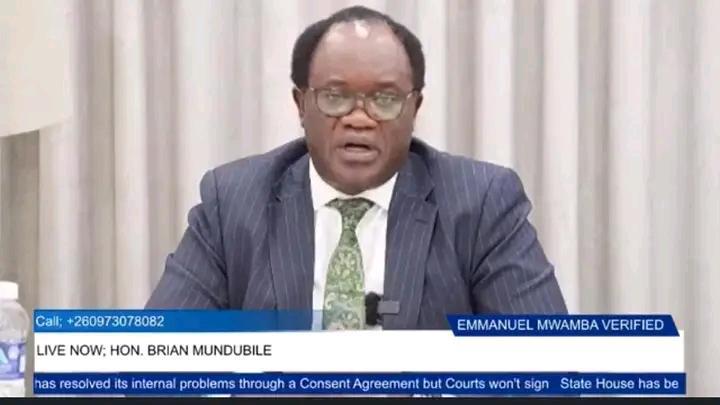Africa-Press – Zambia. On an otherwise quiet night, a storm gathered, not on the streets of Lusaka, but through the airwaves of Emmanuel Mwamba Verified, where Hon. Brian Mundubile delivered a calm yet explosive indictment of the UPND administration. Over three hours, the former Leader of the Opposition navigated a deeply unsettled political terrain, laying bare what he sees as three urgent crises: the state’s cruelty toward a dead president, the coordinated collapse of democratic institutions, and a dangerous trend of tyranny being legislated into law.
It was not campaign rhetoric. It was something deeper: a controlled confession of a country in freefall, a system unraveling before the eyes of its citizens.
THE CRUELTY OF POWER: EDGAR LUNGU AND THE POLITICS OF THE GRAVE
Two months after the death of former President Edgar Chagwa Lungu, Zambia still has not buried him. Not because the nation forgot, but because the state refuses to let go.
_“A man cannot be persecuted in life and then persecuted in death,”_ Mundubile said somberly, pointing to the government’s attempt to “inspect and authenticate” Lungu’s body in South Africa. _“It is an obsession, not a procedure.”
He accused the UPND government of turning a moment of national mourning into a political standoff, pitting the family of a former head of state against the full force of state machinery. It’s a claim that resonates beyond party lines.
From the diaspora, a caller from the UK asked: “If you declared national mourning, if you sent envoys to South Africa, if you invited foreign dignitaries to mourn with us, how are you now questioning if the man is dead?”
What should have been a moment of reflection has become a diplomatic and moral embarrassment, casting a long shadow over the President and his inner circle.
*THE BROKEN CHAIN: WHEN THE EXECUTIVE, JUDICIARY AND LEGISLATURE SPEAK IN ONE VOICE*
Mundubile’s second major charge was direct and damning: Zambia’s three branches of government no longer check one another. They echo each other.
“You can trace a golden thread,” he said, “that connects the Executive, the Judiciary and the Legislature. That thread is stitched with partisan loyalty, not constitutional duty.”
He recalled how even after reconciling internal PF disputes and signing a legal consent with rival Miles Sampa, the judiciary delayed affirming the agreement. In Parliament, the Speaker has refused to recognize the opposition’s chosen leader. And when the Constitutional Court ruled in their favor, the decision was quietly ignored.
“We have a Parliament that no longer functions as a forum for democracy,”_ he added. _“Presiding officers interrupt, silence, and punish MPs who question the government. And that silence is breeding disaster.”
That silence, he argued, is why Zambia finds itself knee-deep in load shedding, drug shortages, and soaring food prices. Not because MPs aren’t speaking, but because Parliament won’t let them be heard.
TYRANNY IN A SUIT: LEGISLATION AS A WEAPON OF CONTROL
The third theme was perhaps the most unsettling. While much of the world looks to authoritarianism as a strongman’s game, Zambia’s version, Mundubile argued, is more sophisticated, it comes wearing a constitutional pin and armed with bills and statutes.
From the Cyber Security Act to the infamous Bills 7 and 13, to the recent move to expand the judiciary’s numbers exponentially, Mundubile outlined what he sees as a legislative hijack, designed not to reform, but to rule.
“Corruption now goes beyond bribes,”_ he explained. _“It’s in how laws are written, how appointments are made, and how institutions are manipulated to entrench power.”
He warned that the new bill to expand Zambia’s superior courts, one that would increase judges in the High Court from 60 to 200 and balloon the Constitutional Court bench, is part of a strategy to flood the judiciary with cadres, not jurists.
“You will appear before people who were waving the UPND symbol just months before,”_ he said. _“And you will call that justice?”
One caller put it more bluntly: “This is tyranny with a legal signature.”
THE QUESTION STILL HANGING: HOW WILL THE OPPOSITION CHOOSE ITS CHAMPION?
With the diagnosis laid bare, attention shifted to what must come next. Mundubile spoke passionately about opposition unity and ongoing behind-the-scenes talks with key figures like Harry Kalaba, Fred M’membe, and others. The goal: present one opposition candidate to challenge President Hichilema in 2026.
But that left one question, my question, unanswered.
Would you be open to a pre-election public primary to allow Zambians to choose their preferred opposition candidate, before the ballot is cast?
The question was not acknowledged, let alone answered.
And yet, it hangs in the air, not just for Mundubile, but for every aspiring leader in the PF, Socialist Party, UPPZ, UDA, or Tonse Alliance. Because in a country where elections are rigged before polling day, where institutions no longer stand neutral, and where the people’s voice is silenced, democracy must begin before the vote.
The opposition must prove it can win in daylight, not just in corridors.
The Zambian people are not asking for saviors. They are asking for a chance to choose who stands up for them.
For More News And Analysis About Zambia Follow Africa-Press







